Press Releases CRC 1357 Microplastics
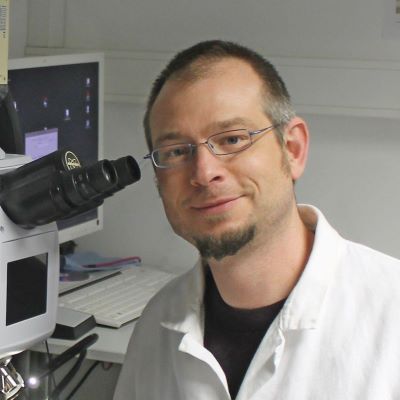
Dr Löder is one of the ‘Highly Cited Researchers 2024’
Dr Martin Löder has already been among the most cited scientists in the environment and ecology category for the past two years. ‘Highly Cited Researchers’ are scientists whose publications are most frequently cited by other scientists in scientific journals worldwide. An overview of all SFB publications can be found in the ‘Publications’ section.
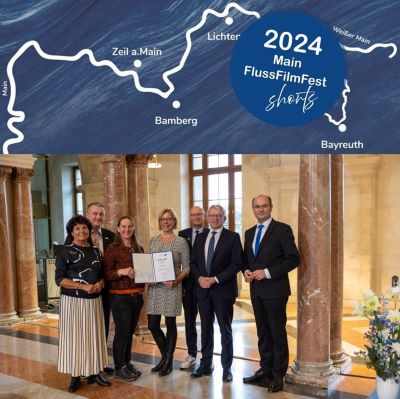
© StMFH/Christian Blaschka
Bavarian Environmental Award 2024 for the cooperation with the CRC Microplastics
The Bavarian State Foundation has honoured the Main RiverFilmFest and the Bayreuth region's Water Month in the Bavarian State Chancellery with the Bavarian Environmental Award 2024 as a unique cooperation project. The CRC Microplastics has participated in the Main FlussFilmFest as part of the cooperation.

Dr Anja Ramsperger receives the Bavarian Culture Prize 2024
Dr Anja Ramsperger from the Collaborative Research Centre 1357 Microplastics at the University of Bayreuth has been awarded the Bavarian Culture Prize for her outstanding PhD thesis in the field of biology. The Bayernwerk AG (Bayernwerk) prize honours not only creative artists but also doctoral students at Bavarian colleges and universities.

Dr. Florian Pohl is accepted into the Emmy Noether Program of DFG associated with the CRC 1357 Microplastics
The new Emmy Noether Group is integrated into an excellent scientific environment and can make excellent use of the CRC for its further development. In this way, a variety of synergies can be established between the junior research group and the CRC 1357.
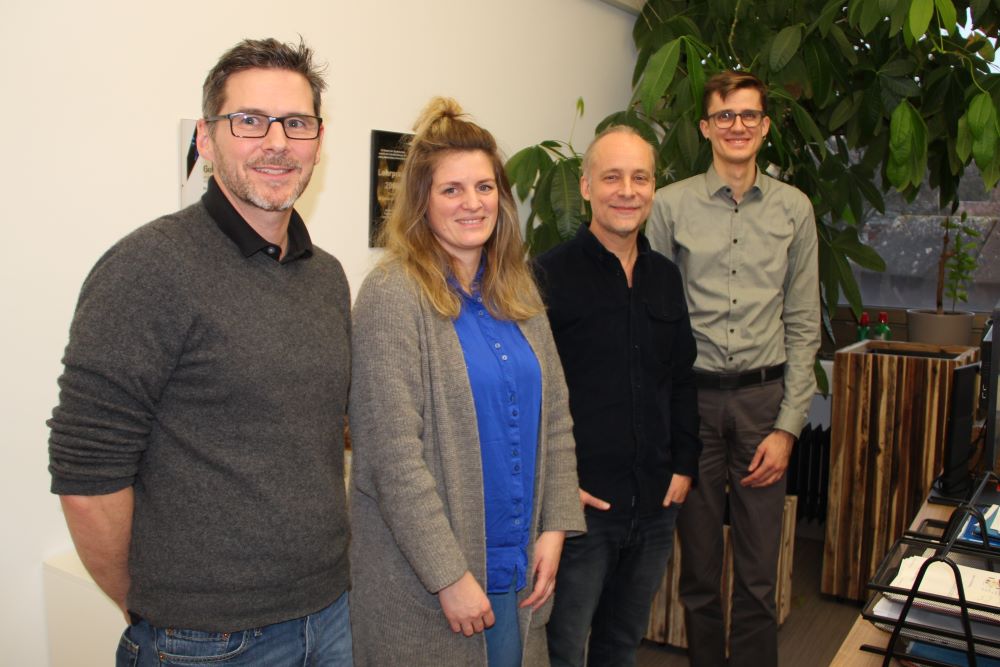
Not all microplastic particles are created equal - new publication in Nature Communications
An interdisciplinary research team from the Collaborative Research Centre 1357 – “Microplastics” at the University of Bayreuth and the Leibniz Institute of Polymer Research Dresden discovered that seemingly identical polystyrene microplastic particles from different manufacturers tremendously differ in their physicochemical properties.
- Press Release UBT
- Original Article - Nature Communications

SCRC Microplastics is exhibiting at the Week of the Environment in Berlin
The Environment Week in the park of Bellevue Palace offers the opportunity to find out about the latest findings and developments on environmental and sustainability issues.
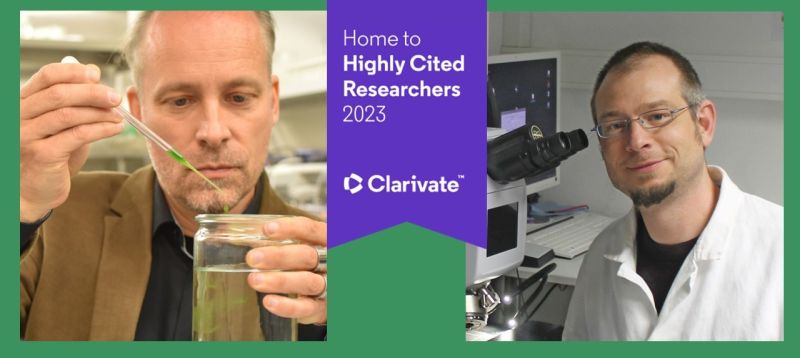
Two scientists from the University of Bayreuth are among the world's "Highly Cited Researchers"
For the second time in a row, the University of Bayreuth can be pleased about the worldwide reputation and strong impact of its research work: Prof. Dr Christian Laforsch and Dr Martin Löder have been honoured..
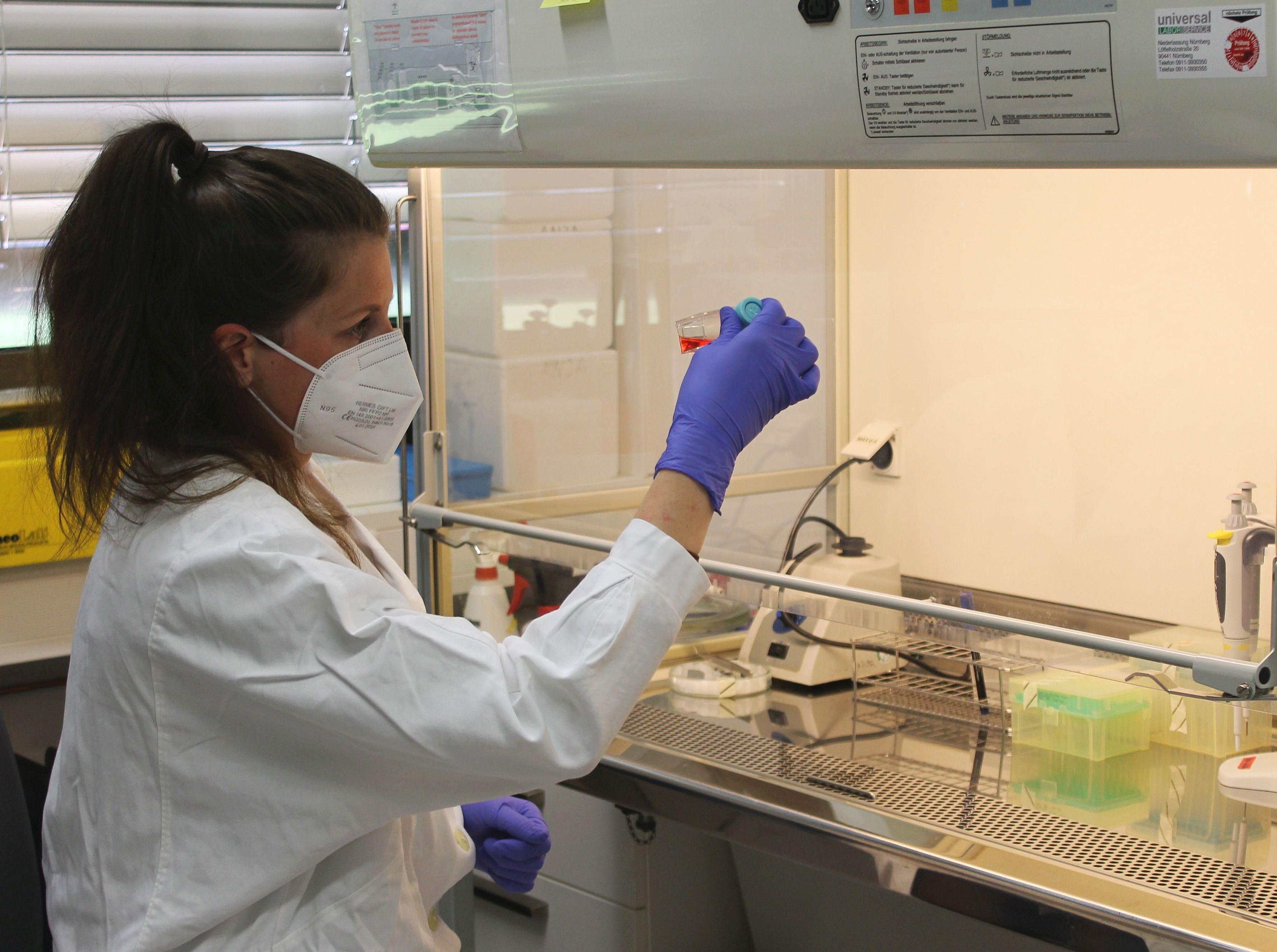
© UBT / Chr. Wißler.
Microplastics in human tissue samples: International study warns against drawing premature conclusions
The distribution of microplastics and nanoplastics in the environment, the potential of human exposure and particle uptake, and the absorption of these particles into tissues are topics that are being intensively researched worldwide. An international research group of the EU project "PlasticsFatE" under the leadership of Prof. Dr Christian Laforsch at the University of Bayreuth has evaluated international research literature on these issues. The results presented in the journal "NanoImpact" show: Concerning the risks for humans, the evidence is less certain than the broad spectrum of publications might suggest.
- Press Release UBT
- Original Article - NanoImpact
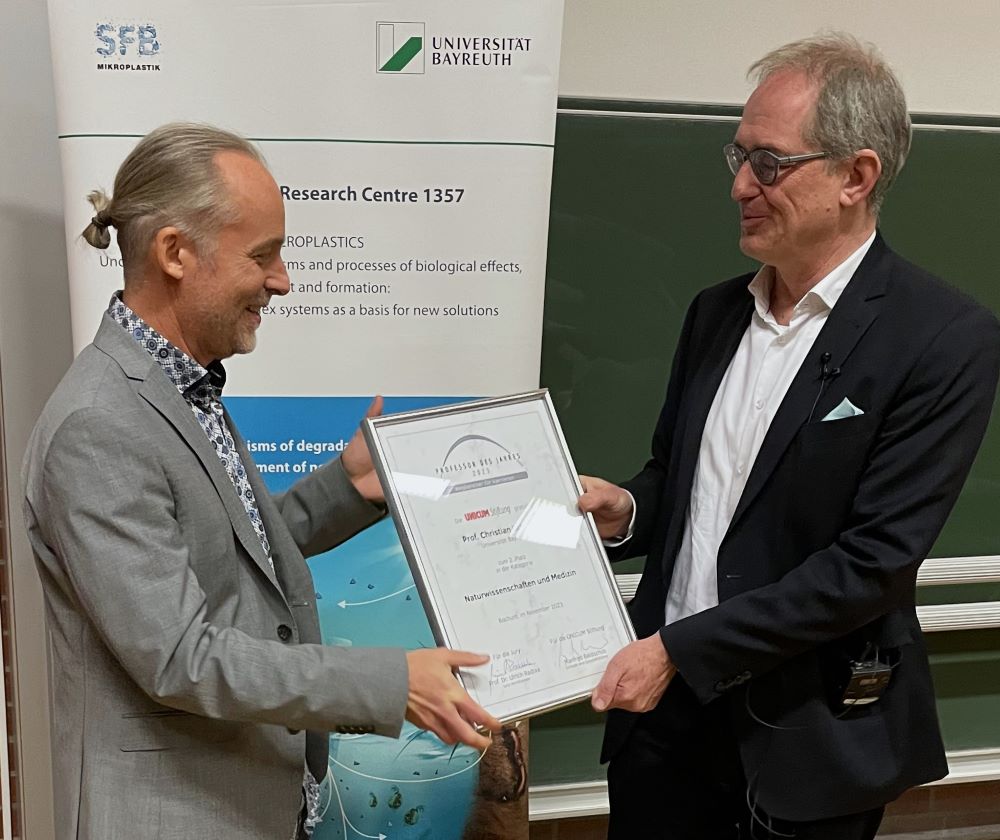
Prof. Dr Christian Laforsch honoured as Professor of the Year
Prof. Dr Christian Laforsch, Chair of Animal Ecology I and spokesperson of the Collaborative Research Centre Microplastics at the University of Bayreuth, may now hold the title "Professor of the Year". The UNICUM Foundation has awarded him this title.
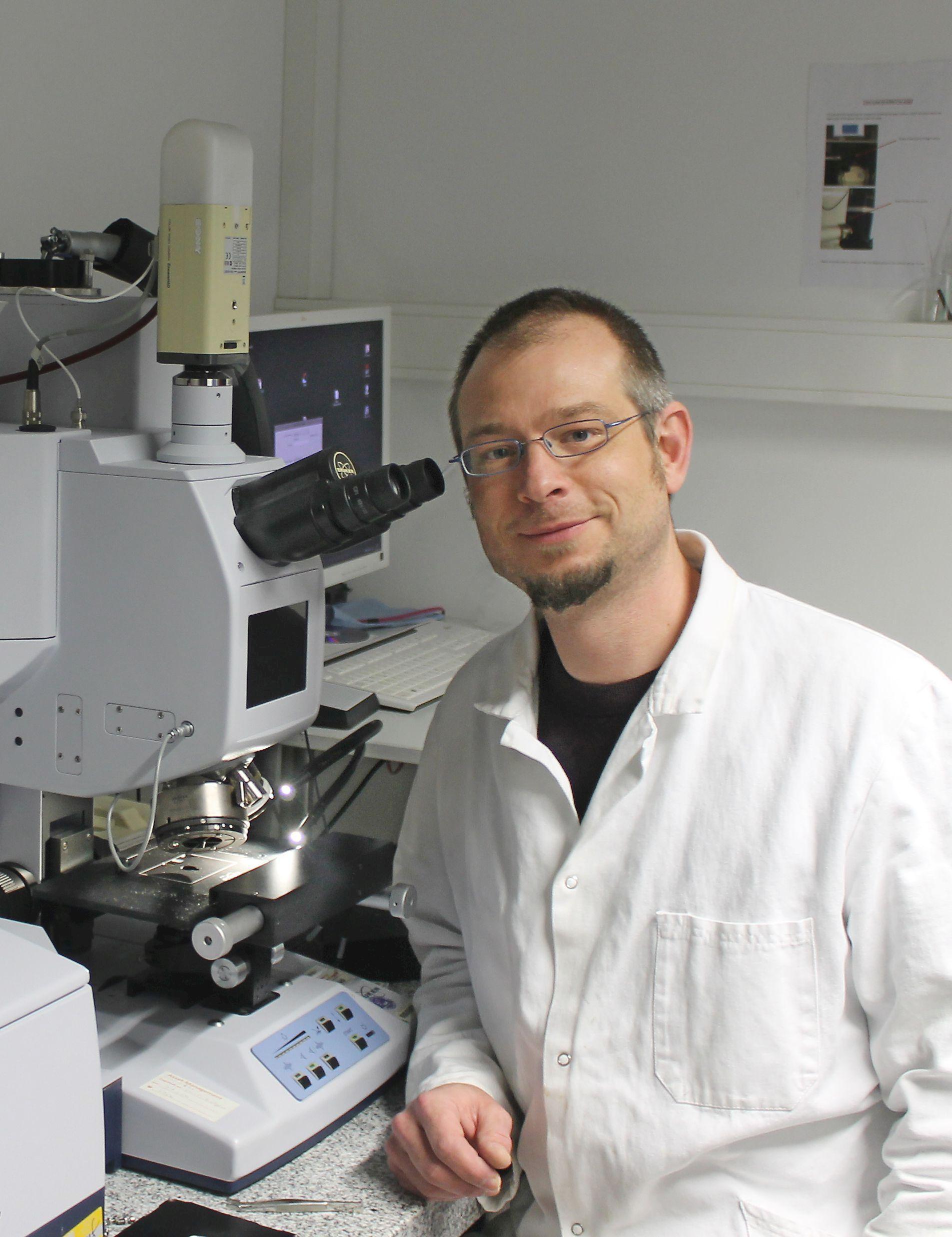
© UBT / Chr. Wißler.
Young scientist at the University of Bayreuth featured as "Highly Cited Researcher 2022”
Dr. Martin Löder, environmental researcher at the University of Bayreuth, has been featured as a "Highly cited researcher 2022" by the U.S. company Clarivate. This is shown by the ranking "Highly cited researchers 2022" published by the US company Clarivate. The internationally renowned ranking identifies those researchers whose scientific publications from the period 2011 to 2021 are cited most frequently to date. The Bayreuth scientist is a member of the Bayreuth Center of Ecology and Environmental Research (BayCEER) and the DFG Collaborative Research Center 1357 "Microplastics" at the University of Bayreuth. Here he has been teaching and researching at the Chair of Animal Ecology I since 2014.
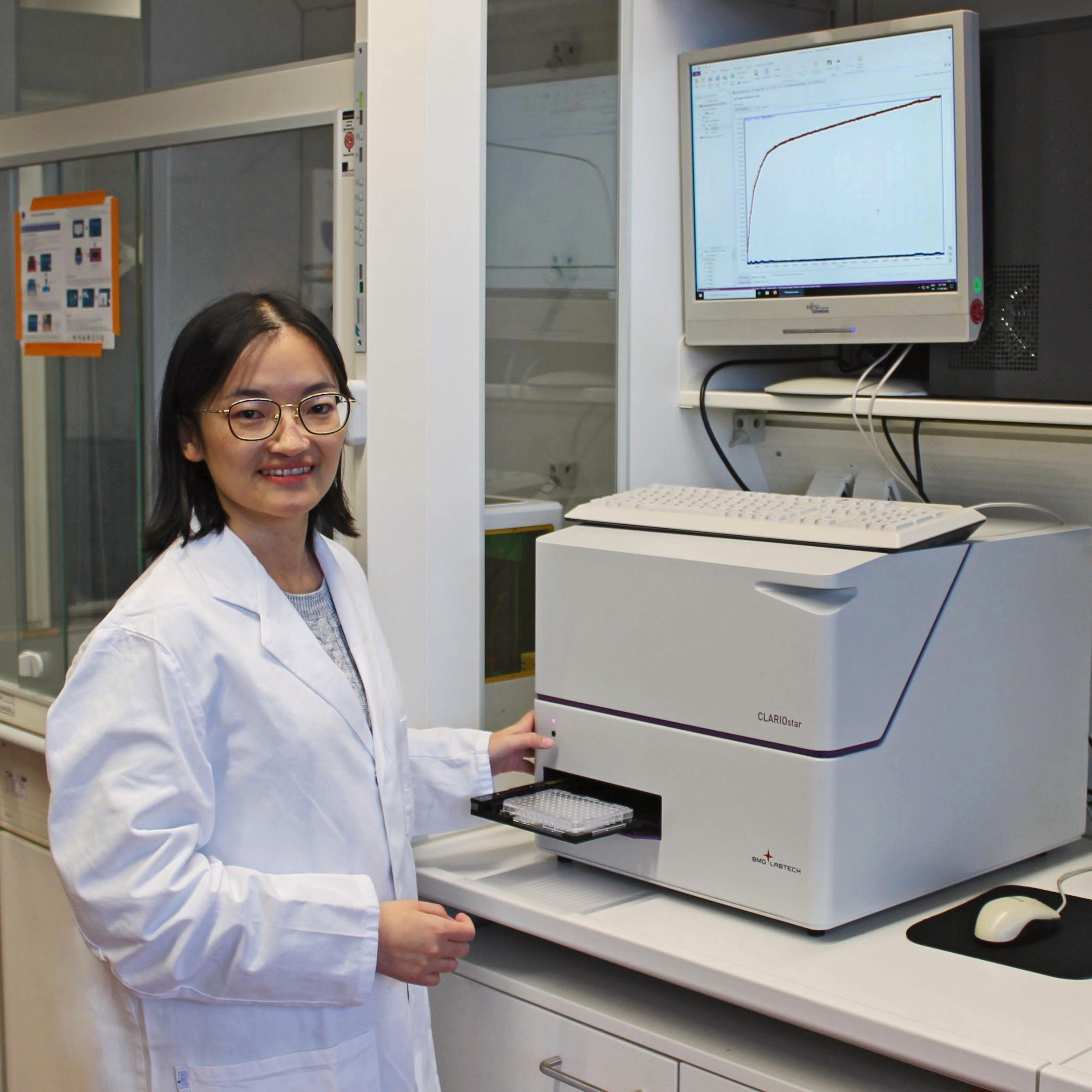
© UBT / Chr. Wißler.
Accelerating plastic degradation in the environment: Bayreuth study researches heat resistance of enzymes
Numerous plastics are principally biodegradable, but are only degraded very slowly in the open air, wastewater, or composting plants. Known enzymes with the ability to degrade plastics could solve this problem. To do so, however, they must be able to withstand high temperatures. An interdisciplinary team from the Collaborative Research Center "Microplastics" at the University of Bayreuth has now presented new methods in the journal "Biomacromolecules" that are a crucial prerequisite for protecting enzymes from high heat. If enzymes are thermally stable, they can be added to biodegradable plastics during production and later accelerate natural degradation.
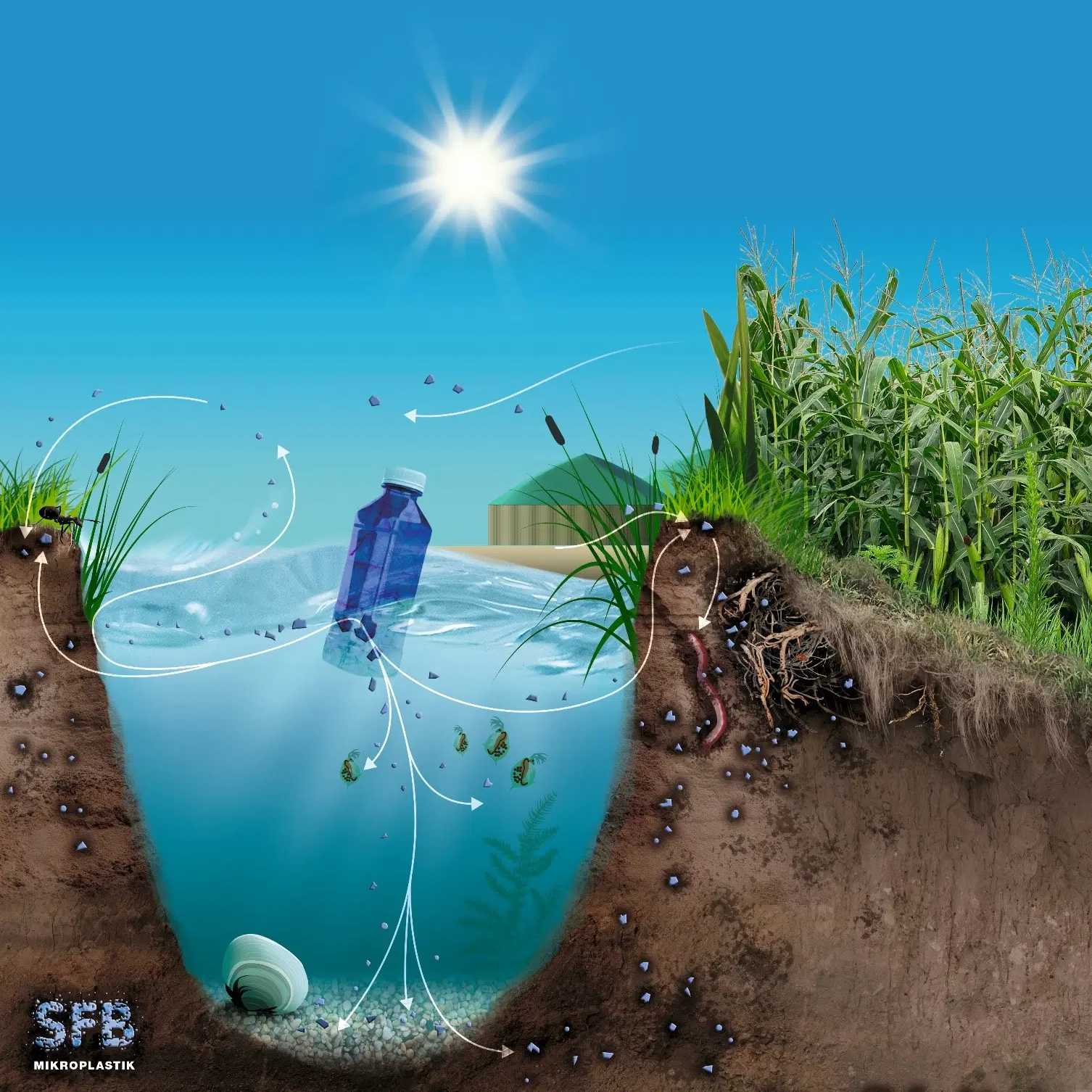
DFG extends Collaborative Research Center "Microplastics" at the University of Bayreuth
The German Research Foundation (DFG) will again fund the Collaborative Research Center 1357 "Microplastics" at the University of Bayreuth with approximately 13 million euros over the next four years. Established in 2019, the CRC investigates the increasing contamination of the environment by plastics worldwide and develops innovative solutions to counteract the resulting ecological, health and economic dangers. The close linking of interdisciplinary basic research with problem-related application research will enable well-founded risk assessments and further strengthen the transfer of knowledge to the public.
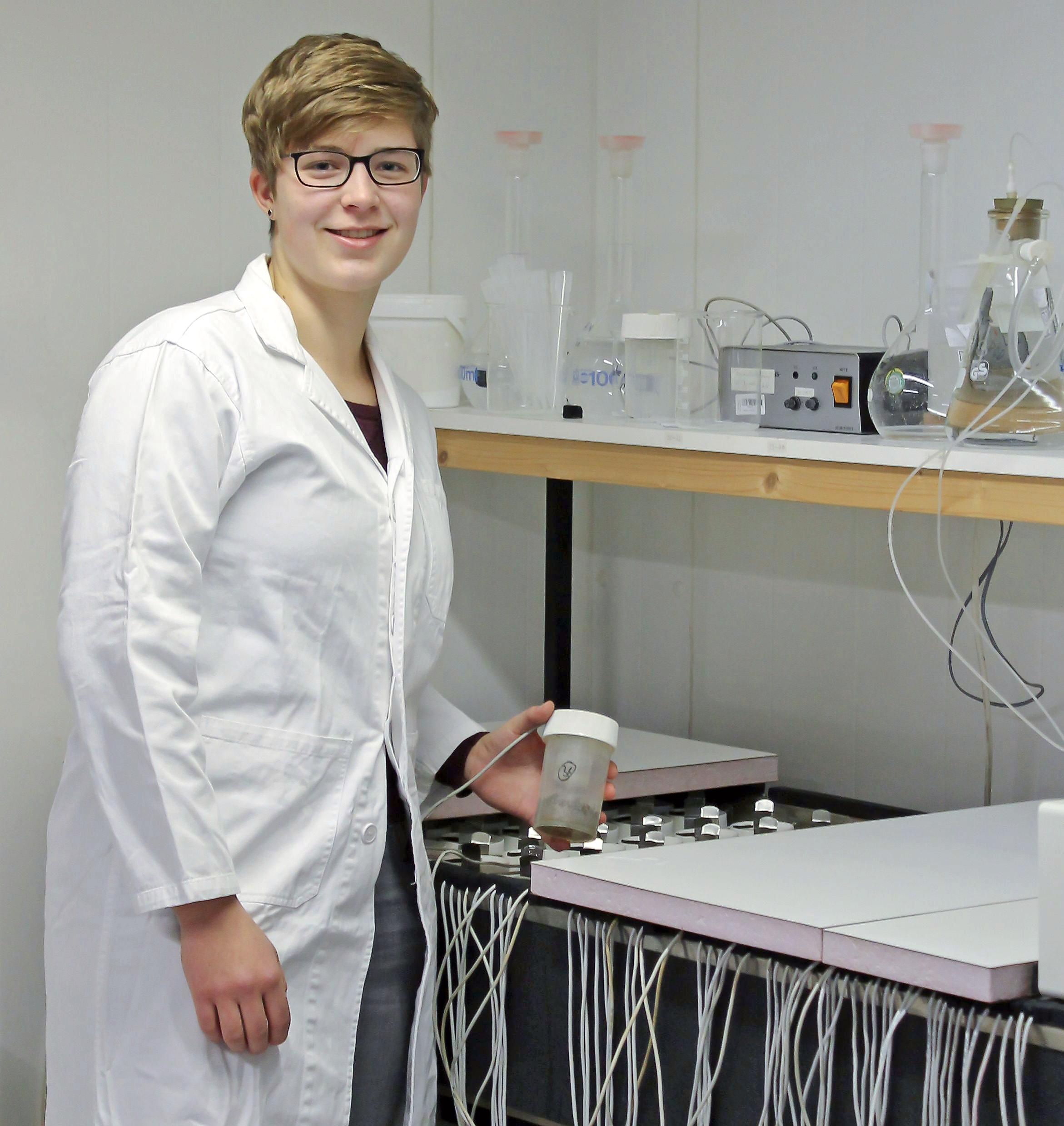
© UBT / Chr. Wißler.
Neue Studie der Universität Bayreuth: Bioabbaubares Mikroplastik in Böden lässt CO₂-Emissionen ansteigen
Biologisch abbaubare Mikroplastik-Partikel in Böden können zu einem verstärkten Anstieg von CO₂-Emissionen in die Erdatmosphäre führen. Dies zeigt eine interdisziplinäre, in „Applied Soil Ecology“ veröffentlichte Studie des Sonderforschungsbereichs 1357 „Mikroplastik“ an der Universität Bayreuth. Expert*innen für Bodenökologie und ökologische Mikrobiologie vergleichen darin erstmals in systematischer Form die Auswirkungen eines herkömmlichen und eines bioabbaubaren Kunststoffs in unterschiedlichen Böden. Auch die Folgen für die mikrobielle Biomasse in den Böden, insbesondere für Bakterien und Pilze, werden analysiert.
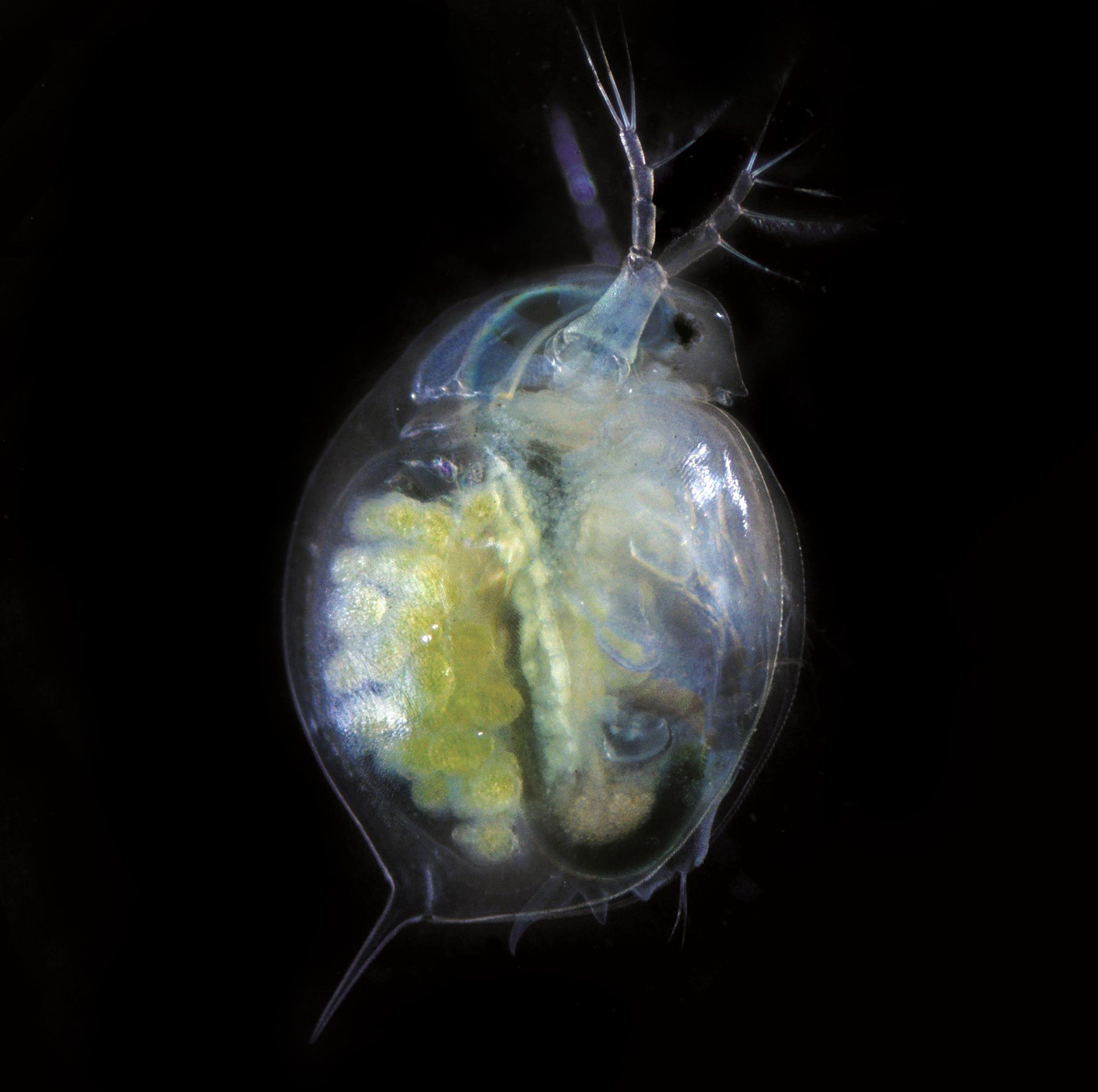
Erschienen am 25.10.2022 - © Max Rabus, UBT
Bayreuth case study discovers ecological impact of water-soluble polymers
Water-soluble synthetic polymers (WSSPs) are found in many everyday products. What the consequences are when these plastics enter rivers, lakes and oceans is still largely unexplored. A team from the University of Bayreuth has now systematically investigated the effects on water fleas of the species Daphnia magna for the first time. The polymers selected for testing significantly alter the body size and reproduction of the animals in some cases. The research, published in Science of The Total Environment, shows that water-soluble polymers could have consequences for biodiversity and food chains in aquatic ecosystems that should not be underestimated.

© Jens Peiffer, privat
Detecting microplastics in water: graduate of the University of Bayreuth receives VDE prize for innovative measurement method
Jens Pfeiffer M.Sc., graduate of the master's programme "Mechanical Engineering" at the University of Bayreuth, has been awarded the "Absolventen-Preis 2022 des VDE Nordbayern" by the Association of Electrical, Electronic & Information Technologies (VDE). A method he has developed makes it possible for the first time to identify microplastic particles in water with high precision and will potentially be able to make an important contribution to ecological research and environmental protection. The award will be presented on 22 October 2022, during this year's Graduate Day of the Faculty of Engineering on the campus of the University of Bayreuth.
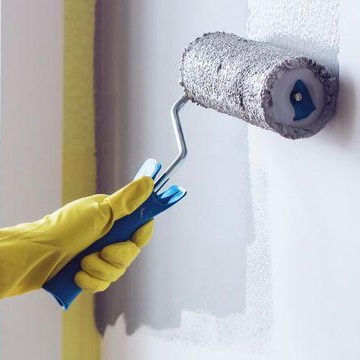
Released 17.08.2022
Particles from everyday wall paints can harm living organisms –novel membrane shows high filtering effects
Dispersion paints are mostly used in households for painting walls and ceilings. An interdisciplinary research team from the University of Bayreuth has now analysed the chemical composition of two typical dispersion paints and discovered a large number of solid particles in them which are only a few micro- or nanometers in size. Studies on biological test systems showed that these particles can harm living organisms. Using a novel membrane developed at the University of Bayreuth, these particles can be filtered out of water before they enter the environment.
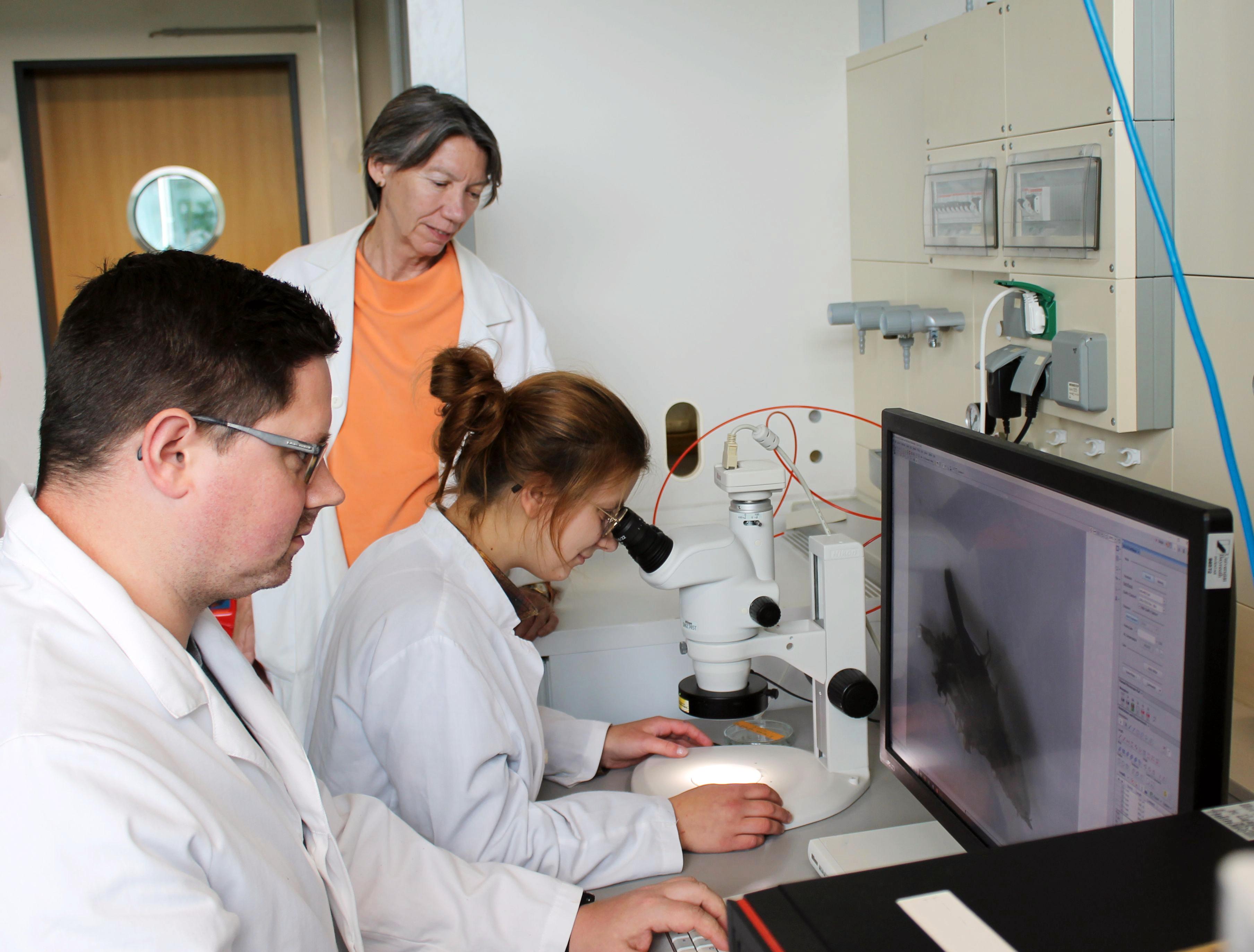
Released 28.06.2022 - © UBT / Chr. Wißler.
New study from Bayreuth: Fertilisers from composting plants contain large quantities of biodegradable plastics
Composting plants process biowaste into finished compost, which ends up as fertiliser in the soils of fields and gardens. A study by the University of Bayreuth shows that finished compost from composting plants in Germany contains a large number of biodegradable plastic particles. Applicable legal and certification standards are not violated by the sizes and quantities of the particles detected. However, the data published in "Scientific Reports" call into question the contribution of these standards to effective environmental protection. They draw into question whether biodegradable plastics are suitable for replacing conventional plastics in environmentally and nutritionally sensitive areas.
- Press Release UBT
- Original Article - Science Report
- Article Süddeutsche Zeitung
- Article FAZ
- Article Die Zeit
- Article Augsburger Allgemeine
- Article RTL
- Article Frankenpost

Released: 18.05.2022 - © Lukas Kienzler
New study examines microplastic pollution in Rhine floodplain near Cologne
Microplastic particles can be deposited in river floodplains and penetrate into deeper areas of the soil. The number of particles identified depends in particular on surface plant cover, the frequency of flooding, and soil properties. Researchers from the Universities of Bayreuth and Cologne determined this during investigations in the Rhine floodplain of Langel-Merkenich north of Cologne. The study, published in the journal "Science of the Total Environment", is the result of interdisciplinary cooperation in the DFG Collaborative Research Centre 1357 "Microplastics" at the University of Bayreuth.
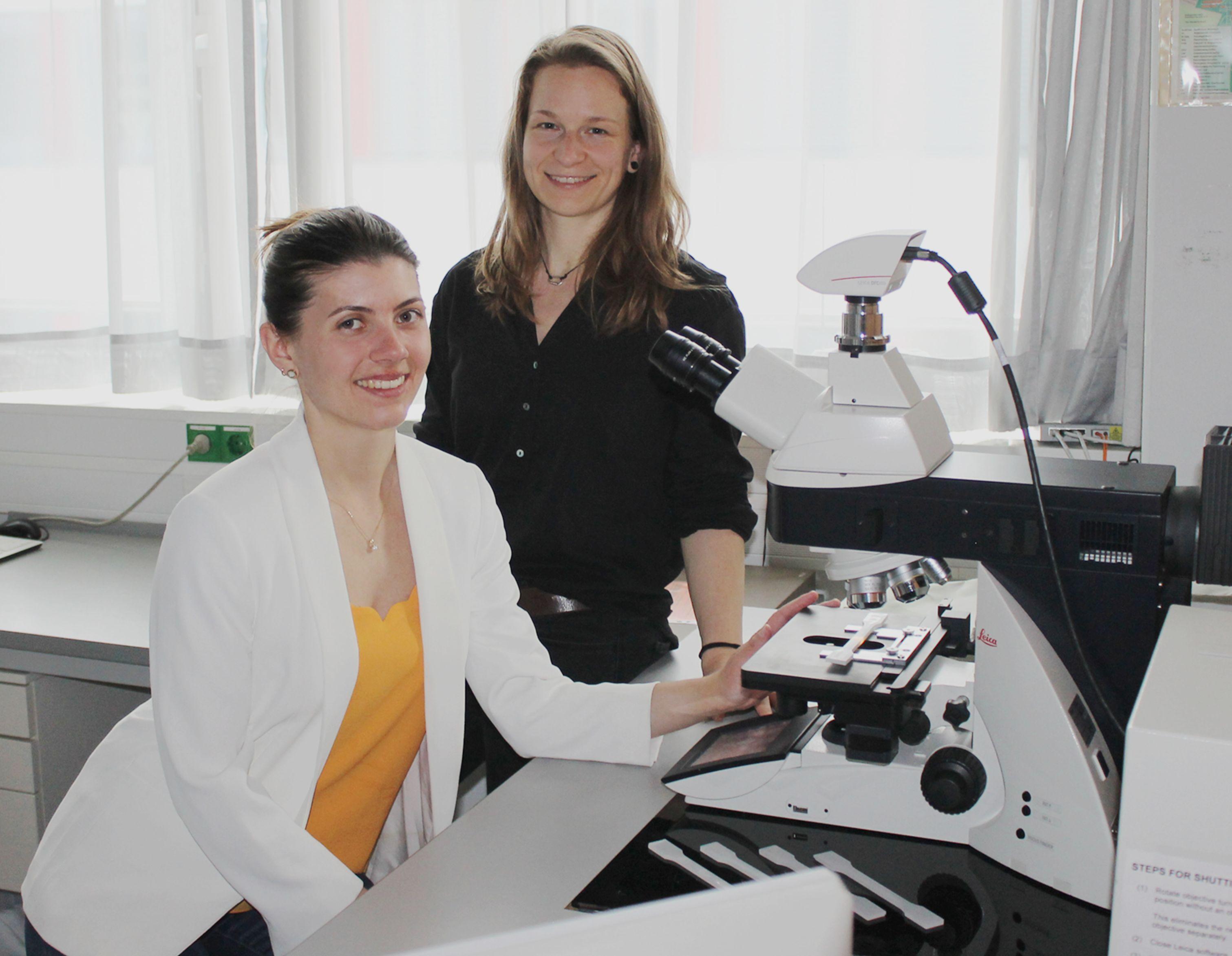
Released: 27.04.2022 - © UBT / Chr. Wißler
Nanoplastic particles love company: researchers in Bayreuth analyze polyethylene degradation in the environment
Polyethylene, a plastic that is both cheap and easy to process, accounts for nearly one-third of the world’s plastic waste. An interdisciplinary team from the University of Bayreuth has investigated the progressive degradation of polyethylene in the environment for the first time. Although the degradation process leads to fragmentation into ever smaller particles, isolated nanoplastic particles are rarely found in the environment. The reason is that such decay products do not like to remain on their own, but rather attach rapidly to larger colloidal systems that occur naturally in the environment. The researchers have now presented their findings in the journal Science of the Total Environment.
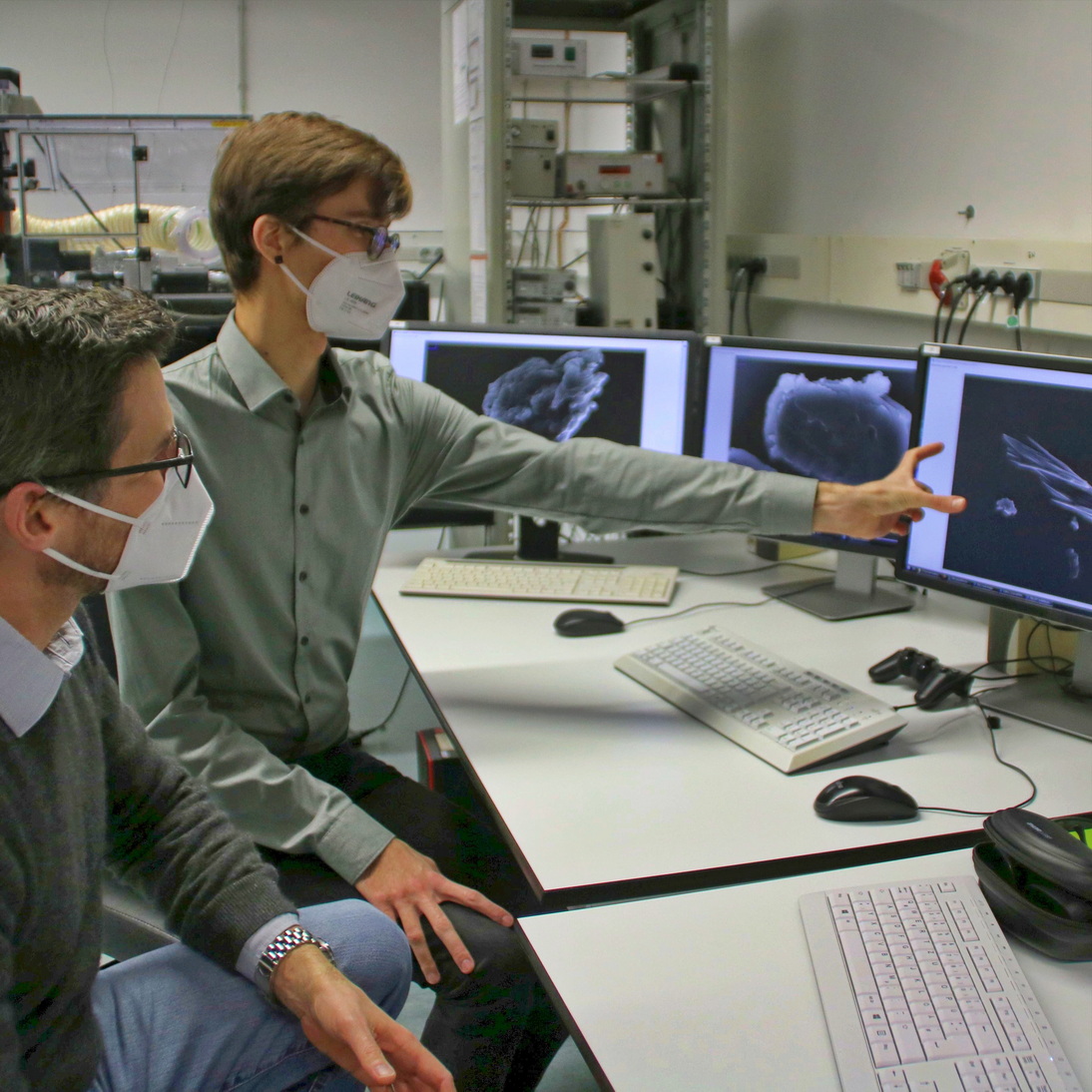
Released: 18.01.2022 - © Jennifer Opel
Learning from dust: microplastic researchers compare health risks of microparticles
What are the consequenes of inhaled microparticles?
In order to better understand them, researchers from the CRC 1357 microplastic at the University of Bayreuth have conducted an interdisciplinary study to find out how the health risks of particles such as soot, grinding dust or asbestos are related to their physical properties. By comparing them with the properties of microplastic particles, more precise statements can be made about their potentially hazardous effects on health.

Released: 29.12.2021
Expert opinion on the plastic bag ban in Germany
The plastic bag ban will come into force on 1 January 2022. Then, with few exceptions, plastic bags may no longer be sold at supermarket checkouts. Prof. Dr. Christian Laforsch, spokesman of the Collaborative Research Centre (SFB) Microplastics at the University of Bayreuth, sees the plastic bag ban primarily as a symbolic step and emphasises the need for a true circular economy, the avoidance of plastic waste and a higher appreciation of plastics.
Nevertheless, he welcomes the current measures. In addition to the plastic bag ban, these are the ban on disposable articles and an extension of the mandatory deposit, which will be extended to all disposable plastic bottles and beverage cans in 2022..

Veröffentlicht: 13.12.2021 - © C. Wißler
Supposedly similar microplastic particles show different levels of toxicity
More and more studies worldwide are looking into the effects of microplastics, especially with regard to the environment and health. They often use spherical polystyrene microparticles and have arrived at partly contradictory results. An interdisciplinary research team at the University of Bayreuth has discovered a reason for this. Commercially available, supposedly identical polystyrene particles differ significantly, depending on the manufacturer, in terms of their structure and properties. Therefore, their interactions with living cells have different consequences for cell metabolism. The scientists have presented their study in the Journal of Hazardous Materials.

Released 22.11.2021 - © M. Pöhlmann
The third place of the Sustainability Award of the University of Bayreuth goes to Sarah Spreng and her bachelor thesis
Sarah Spreng is the third-place winner of the University of Bayreuth's Sustainability Award. Her final thesis "Investigation of adhesion between microplastic particles and cells using microfluidics" within the Bayreuth Collaborative Research Centre "Microplastics - SFB 1357" looks at the increasing contamination of the environment with microplastics. In a large number of experiments, Spreng examined microplastic particles and their adhesion behaviour to different cells. The work contributes to understanding what happens to microplastic particles in the body and what potential health risks result from them.
The work was supervised by PhD student Simon Wieland and Prof. Dr. Holger Kress (Experimental Physics VI - Biological Physics).

Released 17.11.2021
Rainfall causes microplastic transport into the atmosphere
Oceans, lakes and rivers often contain a large number of microplastic particles on their surface. Impacting raindrops cause many droplets with an almost equally high concentration of microplastics to be thrown up into the air. When they evaporate in the air, the particles enter the atmosphere. Researchers from the University of Bayreuth describe these processes in a new study published in "Microplastics and Nanoplastics". In an initial estimate, which is still fraught with uncertainty in several respects, they come to the conclusion that, worldwide, up to 100 trillion microplastic particles could enter the atmosphere every year as a result of rainfall.

Released 22.10.2021 - © UBT
Ceremonial award: Science journalist Dirk Steffens is an honorary doctor of the University of Bayreuth. The CRC 1357 personally offered its congratulations!
A journalist who presents complex geoscientific and biological issues to a broad audience in a very appealing way, and places great value on the scientific soundness of the topics conveyed: Dirk Steffens, who has been an honorary doctor of the Faculty of Biology, Chemistry & Earth Sciences at the University of Bayreuth since last year, was personally honoured with a ceremony at the Audimax hall of the University of Bayreuth on Thursday, 21 October 2021.
At the ceremony, the CRC1357 Microplastics was present with a small exhibition and the two speakers Prof. Laforsch and Prof. Greiner had the opportunity for an in-depth conversation.

Released 22.09.2021 - © UBT
"Mouse Door Opener Day" at the Collaborative Research Centre for Microplastics and the Ecological Botanical Garden at the University of Bayreuth
Nationwide "Mouse Door Opener Day" on October 3rd - also in Bayreuth. The Collaborative Research Centre Microplastics and the Ecological Botanical Garden of the University of Bayreuth invite preschool and primary school children to look behind the doors of the laboratories. There they can discover what microplastics are and what happens to them in the environment. They can feel for themselves what properties soils have and learn about animals that occur in soils and waters. Participation is only possible after registration at anmeldung-maus@uni-bayreuth.de, the number of places is limited!

Released 19.07.2021 - © Christian Wißler, UBT
Pathogenic fungi colonise microplastics in soils
Representatives of numerous pathogenic fungal species are finding new habitat on microplastic particles in the soil and could thus be one of the possible causes of an increase in fungal infections. Researchers from Bayreuth, Hannover and Munich demonstrated this in a new study. Using high-throughput methods, the scientists analysed fungal communities from soil samples taken from sites near human settlements in western Kenya. The findings of this research have been published in the journal Scientific Report.

Released 08.07.2021 - © i-Stock
United against microplastics in food: New joint project strengthens cooperation between research and industry
High-tech methods for detecting microplastics in food and suitable prevention measures are the focus of the joint German-Austrian Cornet project "MicroplasticATfood", which kicked off on 1 July 2021. With its expertise in microplastic research, the University of Bayreuth is involved in interdisciplinary case studies dealing with packaging, filling lines, beverages, surfaces of solid food, and soluble foods. On the German side, the project will be funded by the Federal Ministry for Economic Affairs and Energy until 2023 to the tune of € 542,000, of which about € 275,000 have been allocated to the University of Bayreuth.

Released 17.06.2021 - © Christian Wißler
New long-term study by the University of Bayreuth shows the rapid formation of micro- and nanoplastics in the environment
Most microplastic particles in the environment originate from larger pieces of plastic. In a long-term study, an interdisciplinary research team at the University of Bayreuth has simulated how quickly plastic breaks down into fragments under natural influences. High-tech laboratory tests on polystyrene show two phases of abiotic degradation. To begin with, the stability of the plastic is weakened by photo-oxidation. Then cracks form and more and more and smaller fragments are released into the environment. The study, published in the journal "Environmental Science & Technology", allows conclusions to be drawn about other plastics that are common in the environment.

Released 15.06.2021 - © Logo Papillons
University of Bayreuth partner in new EU project on effects of micro- and nanoplastics in agriculture
The University of Bayreuth is a partner in the new European "PAPILLONS" consortium for micro- and nanoplastics research in agriculture. 20 universities and research institutions from 12 countries will jointly investigate the sustainability of plastic use in European agriculture. The focus is on the input of plastic particles and chemical additives into arable land, and their possible ecological and socio-economic effects. The European Union is funding the project until 2025 to the tune of € 7.2 million in total, of which € 600,000 euros have been allocated to the University of Bayreuth. At a virtual kick-off meeting on 14 and 15 June 2021, the research partners agreed on what the next steps in their work would be.

Erschienen am 28.04.2021 - © Christian Wißler
New European project investigates health effects of plastic particles on humans
Researching the effects of plastic particles on the human organism and developing a health policy strategy for assessing the resulting risks is the goal of the new European research network PlasticsFatE. The University of Bayreuth and 26 other universities, institutes and organisations from ten EU member states are participating in the project. The European Union is funding the four-year project with around six million euros, with the University of Bayreuth accounting for more than 465,000 euros. The project was launched on 28 April 2021 at a virtual kick-off event for the partners.

Released 23.02.2021 - © UBT
Bayreuth researchers investigate effects of microplastics on agricultural soils
The effects of microplastics on soil quality and the growth of agricultural crops are the focus of a new interdisciplinary research project at the University of Bayreuth. The project is funded by the German Research Foundation (DFG) and is part of the "Microplastics" Collaborative Research Centre (CRC 1537) established at the University of Bayreuth in 2019.

Released 18.01.2021 - © iStock
Teacher training on microplastics: How distance learning on current research topics can succeed
Cutting-edge research and distance learning - the University of Bayreuth is bringing these two topics together. Next Wednesday, the Centre for Teacher Education at University of Bayreuth is organizing an online training course for high school teachers on the topic of microplastics. This will not only bring the latest research results from experts in the field of research into the classroom. There will also be aids for distance teaching.

Released 16.12.2020 - © iStock/JackF
Bayreuth study: the most consumed species of mussels contain microplastics all around the world
"If you eat mussels, you eat microplastics." This was already known to a limited extent about mussels from individual ocean regions. A new study by the University of Bayreuth, led by Prof. Dr. Christian Laforsch, reveals that this claim holds true globally. The Bayreuth team investigated the microplastic load of four mussel species which are particularly often sold as food in supermarkets from twelve countries around the world. The scientists now present their research results in the journal "Environmental Pollution".
University of Bayreuth Study: Natural environmental conditions facilitate the uptake of microplastics into living cells
The environment is polluted by microplastics worldwide. Tiny particles enter food chains, and thereby the digestive systems of animals and humans; moreover, they can be inhaled. Instead of being excreted, small microplastics can be incorporated into the body tissue. A research team at the University of Bayreuth has now discovered that microplastic particles find their way into living cells more easily if they were exposed to natural aquatic environments, i.e. fresh water and seawater. The researchers have presented their results in the journal "Science Advances".

Released 03.06.2020 - © RSC
Sustainable plastics: University of Bayreuth researchers contribute to international White Paper
Researchers of the University of Bayreuth have taken a leading role in developing a White Paper on sustainable plastics, which four chemical associations from Germany, the UK, China, and Japan published today under the title "Science to enable sustainable plastics". The White Paper contains numerous recommendations for future research into the environmental impact of plastics, the development of new plastics, as well as recyclability and natural degradation.

Released 24.02.2020 - © UBT
Microplastics in the focus of science and art: Bayreuther Stadtgespräch on 4 March 2020
Professor Dr. Christian Laforsch and the South African artist Mbongeni Buthelezi will talk at the "Bayreuther Stadtgespräch" at the Iwalewahaus in Bayreuth since when they have been dealing with microplastics and plastic waste, what drives them personally to pursue their research and art with passion and why they want to sensibilise us to the topics of sustainability and environmental protection. The title of the talk is: "The plastic age: Unobjective reports on the topic of microplastics unsettle consumers. What researchers really (don't) know and forward-looking solutions."

Released 18.02.2020 - © UBT
„Science meets art“: Public event in Bayreuth with Mbongeni Buthelezi
The South African artist Mbongeni Buthelezi has been invited to Bayreuth for the international kick-off event of the Collaborative Research Centre "Microplastics". From 27 February to 4 March 2020, interested parties can meet and get to know researchers of the SFB and the artist at various public events.

Released 14.02.2020 - © Sabine Greiner
Press talk with Mbongeni Buthelezi
At the invitation of the Collaborative Research Centre "Microplastics", the Cluster of Excellence "Africa Multiple", the Iwalewahaus and the Freundeskreis Iwalewahaus e.V., the South African artist Mbongeni Buthelezi will be a guest at the University of Bayreuth over the next few weeks. At a press briefing on Monday, 17 February 2020, 11.00 a.m., Iwalewahaus, the upcoming public events and the possibilities for media coverage will be presented.
Released 20.09.2019
Plastics and Life Sciences: The 16th Bayreuth Polymer Symposium presents trends for the future
From 22 to 24 September 2019, the University of Bayreuth once again invites you to the Bayreuth Polymer Symposium (BPS). The international conference on the Bayreuth campus now has a tradition of over 30 years as a future forum for polymer science. More than 180 scientists from 21 countries, mainly from Germany, the USA, China, Japan, Israel and the Czech Republic, are expected to attend this year. From basic research to application-oriented research, they will present current research ideas and findings.
- Press Release UBT

Released 12.04.2019
Plastic waste disrupts communication: Bayreuth study shows risks for ecosystems
Plastic waste affects organisms living in water in a way that has received little attention so far: Messenger substances that are indispensable for communication under water accumulate on the surface of plastic particles and can thus no longer fulfil their ecological functions. Scientists at the University of Bayreuth show this in a new study using water fleas as an example. The animals form defence structures when messenger substances signal to them that they are threatened by predators. However, the defences are significantly weaker as soon as there is plastic waste in the water. The scientists present their findings in Scientific Reports.

Released 25.03.2019 - © wwf
In 100 places at the same time: Microplastics expert from the University of Bayreuth in Livestream – discussion by WWF and VHS
"How do we stop the plastic flood?" is the title of an interactive lecture event offered by the World Wildlife Fund (WWF) Germany and the German Adult Education Association (VHS) with Prof. Dr. Christian Laforsch, holder of the Chair of Animal Ecology at the Faculty of Biology, Chemistry and Geosciences at the University of Bayreuth. On-site at the Bayreuth VHS and via Livestream in more than 100 VHS at the same time, viewers can actively participate and ask their questions directly to the experts on 27 March 2019.
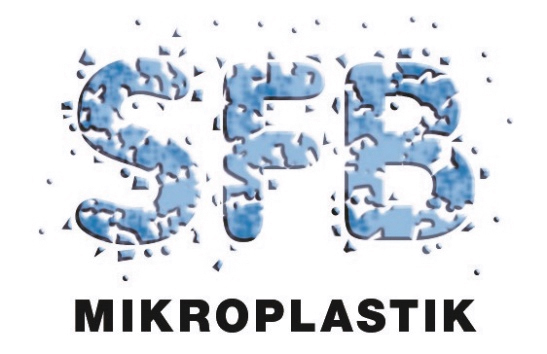
Released 26.11.2018
High-End Science: New Collaborative Research Centre for the University of Bayreuth
Today the University of Bayreuth has one more reason to celebrate: The German Research Foundation (DFG) is to install a new Collaborative Research Centre (CRC) at the University of Bayreuth. The CRC will research the effects of microplastic, including its migration and formation, and develop new approaches to solving this immense environmental problem. Over the next four years, the DFG will fund the CRC with more than 10 million euros.
- Press Release UBT: High End Science
- Press Release "German Science Foundation"
- News Article Süddeutsche Zeitung (in German)
- News Article Nordbayerischer Kurier 26.11.2018 (in German)
- News Article Nordbayerischer Kurier 04.12.2018 (in German)

